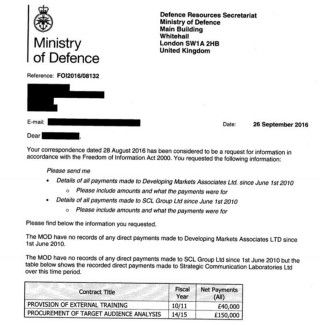A whistleblower has thrown new light on how Cambridge Analytica, the notorious data analytics firm, breached Facebook rules to acquire private information on over 50 million people to target American voters.
The revelations raise urgent questions about the use of psychological manipulation techniques on Facebook to influence voter choices, not just in the 2016 presidential elections, but also in the Brexit referendum.
Yet there are a number of key threads that have been forgotten, or missing entirely, from much of the recent reporting.
One is that Cambridge Analytica is an offshoot of SCL Group, a former UK Ministry of Defence contractor which retains close ties to the British Foreign Office (FCO) and other elements of the UK political and financial establishment.
So close, that just last year the Foreign Office executive agency, Wilton Park, invited SCL Group subsidiary, SCL Elections, to speak about how the use of data in the 2016 Presidential election could be applied in the British government’s diplomatic and foreign policy agenda.
As I reported in an investigation into Facebook’s path toward achieving greater surveillance reach than even the NSA, the two SCL Group executives who addressed FCO officials in February 2017 were Mark Turnbull, managing director of SCL Elections, and David Wilkinson, then lead data scientist.

Cambridge Analytica, the US-based data firm, was created by SCL Elections as an incorporated venture with right-wing billionaire Robert Mercer. But SCL and Cambridge Analytica are, for all intents and purposes, “one and the same.”
According to a Wilton Park conference program document, Turnbull and Wilkinson addressed the FCO conference on the subject of “examining the application of data in the recent US Presidential election”.
The meeting was attended and opened by Jonathan Allen — then the FCO’s Acting Director General for Defence and Intelligence. Allen is now Theresa May’s Deputy Permanent Representative to the United Nations.

The document describes the conference as designed to “explore new opportunities for the FCO to make better use of data in diplomacy, but also emerging threats that challenge the current ways of working.”
The forum’s focus was on assessing “opportunities and threats” that are “of particular application to the FCO’s role in diplomacy and making international policy.” Intended outcomes of the meeting included:
“Ideas and recommendations for the FCO to consider in making better use of data in foreign policy.”
SCL Elections’ Mark Turnbull has a rich history of overseeing psychological warfare operations on behalf of the US and UK governments in Iraq and Afghanistan.

During a long stint at PR firm Bell Pottinger, he oversaw a $540m US Department of Defense contract for “information operations and psychological operations”.
This involved creating and distributing fake al-Qaeda videos in Iraq.
Before landing the SCL gig, Turnbull set up a specialist strategic communications division for Aegis Defense Services, another giant UK defence contractor operating in Iraq and Afghanistan under a number of hundred million dollar contracts with the Pentagon.
In this context, it is not surprising that the SCL’s Foreign Office connections appear to go back a long way. According to now deleted extracts from an archived version of the company’s old website, SCL boasted of “an extensive worldwide track record and enquires can be directed through any British High Commission or Embassy.”
The reference to an open door enquiry process via any British embassies in the world indicated a symbiotic relationship with the British Foreign Office.
When I contacted the FCO about this, the response was decidedly evasive. I asked not only about whether SCL Group still held such a symbiotic relationship with the FCO, but further whether the company’s Facebook campaign operations to influence national elections had ever been pursued in service to British foreign policy interests.
A spokesperson replied simply with:
“I am looking into your query however I have been advised you maywish to contact the Ministry of Defence on this matter.”
Despite follow up requests, no further clarification on SCL Group’s relationship to the FCO, symbiotic or otherwise, was forthcoming.
When I contacted the Ministry of Defence, a government spokesperson confirmed that the SCL Group has no active contracts with the MoD, and therefore “no access to classified or confidential MoD information.” However, the spokesperson did not clarify when SCL Group was last contracted by the MoD, and for what purpose.
For a considerable period in the past, SCL Group was classified by the MoD as a ‘List X’ contractor. List X contractors work on UK government contracts which require them to hold classified information at their own premises or other specific sites.
Information released under Freedom of Information (thanks to journalist Liam O’Hare for highlighting) reveals that ‘Strategic Communications Laboratories Ltd’, SCL Group’s previous company name, had in fact been contracted by the MoD for ‘Target Audience Analysis’ as recently as about a year before the 2016 presidential elections — specifically for fiscal year 2014/15.

SCL had also in 2015 received $1m (CAD) from the Canadian government to deliver a NATO course in “advanced counter-propaganda techniques” in Eastern Europe.
Alarm over emerging details on SCL/Cambridge Analytica’s use of mass behavioural profiles developed from Facebook to influence public opinion is, of course, entirely warranted. But these techniques are not exclusive to this particular firm.
These techniques designed to influence mass populations have been developed and applied in the bowels of the Anglo-American military-industrial complex for decades, and continue to be deeply researched at multiple levels by numerous national security agencies.

That breakaway entities such as Cambridge Analytica seek to profit from these techniques simply extends and follows through with the internal logic of a system which promotes the state-backed privatisation of mass surveillance.
The emergence of Big Data in the context of an increasingly militarised form of neoliberal capitalism has opened up a new digital ‘frontier’ for corporate profit maximisation: the digitisation of even the minutest details of private and public lives. Which is why platforms like Facebook, Google and others are lobbying for the deregulation of data.
Cambridge Analytica’s data breach on Facebook is a tip of the iceberg. An increasingly lucrative business model of the platform, one that is perfectly rational given the logic of the digitisation of capital, is to sell information tools to governments on opposite sides of, often, very real physical battlefields. That, of course, is simply one subset of the wider game which sells such tools of persuasion to any business or corporation that can afford it.
There is a war on for our minds, and Big Data platforms are in the business of profiting from it.
But the solution to this is not, as the British government’s ongoing fascination with SCL/Cambridge Analytica shows, simply government regulation. The real solution is an approach to data which recognises the sovereignty of the people it truly belongs to.









